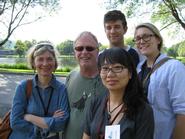
Two Hamilton students and three faculty members participated in the Flaherty Film Seminar at Colgate University June 19 -25. Jori Belkin ’11, Cameron Breslin ’11, Edmund A. LeFevre Professor of English Patricia O'Neill, Visiting Professor of Art History Scott MacDonald, Visiting Assistant Professor of Comparative Literature Su Yun Kim, watched and discussed documentary films from around the world with the filmmakers, and with film scholars, programmers and educators.
The week long seminar is a unique opportunity to learn about contemporary methods of film and video art. The topic for this year's seminar was “Work” and participants were challenged by a wide range of representations of labor, craft and the effects of globalization. Some of the films highlighted at the Flaherty will be shown in the fall during the F.I.L.M series at Hamilton.
The Flaherty seminar has been in existence for 56 years. It was started by the wife of the famous American documentary filmmaker Robert Flaherty. This year 150 participants viewed and discussed at least three films each day for seven days.
“Part of the challenge is to stay mentally alert as the issues that each set of films adds to or modifies one's assumptions about the concepts and ideas that the word "work" implies,” said O’Neill. “In our discussions, people responded to both the aesthetics and the politics of the films, and we talked at length about how film can or cannot represent people's labor, the conditions of work, how people identify themselves through their labor and how the structures of the global economy have reduced people's ability to work on the land or earn enough to support themselves and have families. Many of the films underscored the fact that so many people in the world work very hard just to survive.
“Having the filmmakers present to describe their process in choosing their topics, meeting and in most cases collaborating with the subjects of their films, and editing and other formal choices in the making of their films was most informative and illuminated the ‘work’ of the independent filmmaker. Since most of these films will never be broadcast on television or be seen in the local cineplex, we felt very privileged to see so much.”
The week long seminar is a unique opportunity to learn about contemporary methods of film and video art. The topic for this year's seminar was “Work” and participants were challenged by a wide range of representations of labor, craft and the effects of globalization. Some of the films highlighted at the Flaherty will be shown in the fall during the F.I.L.M series at Hamilton.
The Flaherty seminar has been in existence for 56 years. It was started by the wife of the famous American documentary filmmaker Robert Flaherty. This year 150 participants viewed and discussed at least three films each day for seven days.
“Part of the challenge is to stay mentally alert as the issues that each set of films adds to or modifies one's assumptions about the concepts and ideas that the word "work" implies,” said O’Neill. “In our discussions, people responded to both the aesthetics and the politics of the films, and we talked at length about how film can or cannot represent people's labor, the conditions of work, how people identify themselves through their labor and how the structures of the global economy have reduced people's ability to work on the land or earn enough to support themselves and have families. Many of the films underscored the fact that so many people in the world work very hard just to survive.
“Having the filmmakers present to describe their process in choosing their topics, meeting and in most cases collaborating with the subjects of their films, and editing and other formal choices in the making of their films was most informative and illuminated the ‘work’ of the independent filmmaker. Since most of these films will never be broadcast on television or be seen in the local cineplex, we felt very privileged to see so much.”
Posted June 29, 2010
